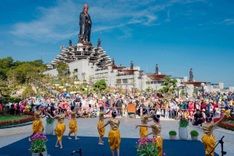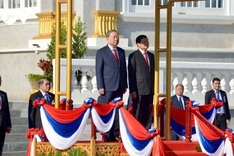Harrison Dillard, who overcame racial prejudice to become the only man to achieve the Olympic double of 100m and 110m hurdles gold, and fought as a Buffalo Solider in the Second World War, was honoured on Friday.

Harrison Dillard jumping over a hurdle during his training at the London Olympics, in 1948
Still in good health at 89 years of age, Dillard won his first gold in 1948 and second in 1952.
Before that he formed part of the 92nd infantry, the segregated "Buffalo Soliders", made up solely of African-American troops, fighting in the Italian campaign from 1943-45.
His life on and off the track was celebrated by the IAAF at their centenary weekend on Friday.
A native and resident of Cleveland, Dillard was inspired by track great Jesse Owens, a quadruple Olympic champion at Berlin in 1936, who received a ticker-tape parade upon his return to the Ohio city.
In 1996, at the time of the Atlanta Olympics, "Long" John, a name derived from his enormous stride, had recalled the "sad conditions" of black athletes in the US, before and after World War II, regardless of their status as Olympic champions.
The four-time Olympic champion -- Dillard also triumphed twice in the 4x100m relay -- also successfully adapted to life off the track.
"He was in charge of communications for the Cleveland Indians for 10 years. He also had a television and radio show and he was responsible for the city's educational department spending," his daughter Terri, who accompanied her father on his transatlantic voyage, told AFP.
On Friday, Dillard sat amongst three hurdlers, who like him, have etched their mark on the discipline with world-record times.
The 89-year-old was joined by American duo Aries Merritt -- the current holder and London champion -- and Renaldo Nehemiah, who ended his career at 22 to pursue a more lucrative livelihood in American football, as well as Britain's Colin Jackson.
Happy "to have lived this adventure", a diplomatic Dillard was reluctant to show preference to any of the hurdlers who have punctuated the heyday of the event.
He also likened the hurdles discipline to "an art" or "a ballet", unlike the chaos of the 100m.
At trials for the 1948 Games, Dillard failed to qualify for the 110m hurdles, but finished third to secure a spot in the 100m.
Despite favouring the hurdles, "Bones" -- a moniker stemming from his slender stature -- won athletics' blue riband event in London in 1948, shading a photo-finish before capturing gold in the 110m hurdles four years later in Helsinki.
The gentlemanly Dillard also spared a thought for his compatriot Mal Whitfield, a double Olympic 800m champion (1948 and 1952), who was unable to travel due to poor health.
In Barcelona, Dillard was able to recount how "Marvelous" Mal, who would later become a US Sports Goodwill Ambassador, served in the country's Air Force during the Korean War.

Former US olympic athlete Harrison Dillard




















